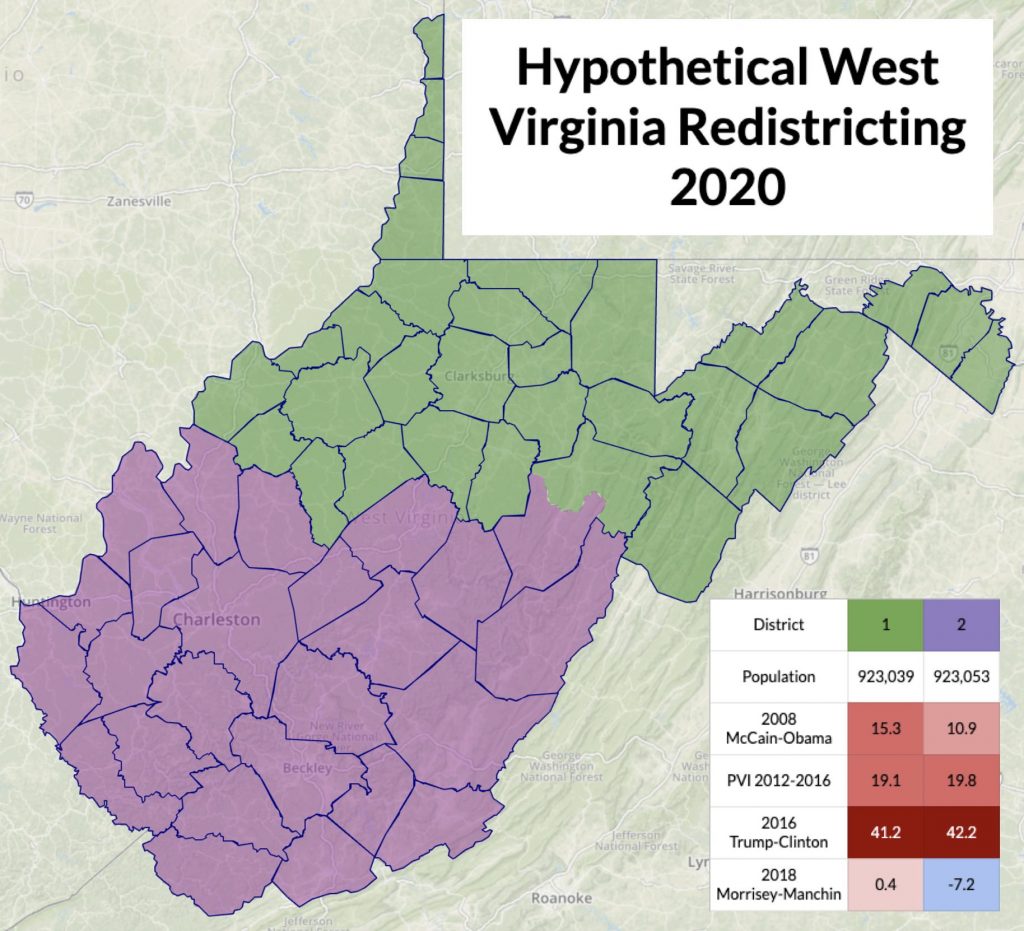West Virginia currently has three members of the U.S. House of Representatives – David McKinley in the first district, Alex Mooney in the second (which includes Morgan County) and Carol Miller in the third.
Because West Virginia has lost population over the last ten years – going from about 1.85 million in 2010 to 1.78 million this year – the state will also lose a member of Congress.
“One of the three members of West Virginia’s congressional delegation will find themselves without a perch in Congress in 2022, when the three vertically stacked districts condense into two,” Politico reported last year. “The most likely new map bifurcates the state into North and South, slicing GOP Rep. Alex Mooney’s central district in half and placing his home base in the Eastern Panhandle with Rep. David McKinley’s northern seat.”
“That means a member-on-member primary is certainly a possibility. McKinley would maintain his entire base and could re-litigate carpetbagging charges against Mooney, a former Maryland state senator and party chair who hopped states shortly before his 2014 run. Mooney, a Freedom Caucus member, could run to McKinley’s right. Alternatively, McKinley could retire, Mooney could step down to prep for a 2024 run for Democratic Sen. Joe Manchin’s seat — or challenge fellow GOP Rep. Carol Miller in the southern seat.”
Redistricting happens every ten years in April after the Census makes its reports to the states. This year, because of the Covid pandemic, the reporting from the Census is late – and results will likely not be delivered to the West Virginia Legislature until September.
In a letter last week to President Joe Biden, West Virginia Secretary of State Mac Warner said that such a delay by the U.S. Census Bureau to get population data to state legislatures could create chaos for the 2022 election cycle.
The U.S. Census Bureau has already moved the deadline to transfer data to the states from March 31 to April 30.
And news started circulating late last week that the Bureau may seek to further delay the data until September 30.
“These delays place unacceptable risk on states’ election administration,” Warner wrote. “Further delay in the delivery of the 2020 Census data will hinder the West Virginia Legislature’s ability to complete redistricting for the 2020 federal election.”
Charles Trump (R-Morgan), chair of the West Virginia Senate Judiciary Committee, said that redistricting will also affect the West Virginia House of Delegates and the West Virginia Senate.
Trump said that while the state has been losing population, the eastern panhandle counties have been gaining population.
“Population gains in the eastern panhandle, compared to the rest of the State, will mean that the districts in the panhandle will get smaller geographically,” Trump said. “The eastern panhandle will add delegate districts, and the senate districts should also shrink in geographic size.”
Trump said that he received an email last week from the National Conference of State Legislatures indicating that it was likely to be September or later before the U.S. Census Bureau releases census data to the state .
“Normally, census data is delivered to the majority and minority party leaders of the legislatures in all fifty states in mid-April in the year following a decennial census,” Trump said. “This delay will mean that it will likely be in an autumn special session of the Legislature when work on redistricting can be undertaken, a tight window, to be sure, given that filing for offices will open in January of 2022 for offices to be filled in the election to be held in November of 2022.”
“Traditionally, the presiding officers of both houses of the legislature each appoint a select redistricting committee, and work starts there, with both the house and senate considering the bills recommended by such a committee” Trump said. “No such committee has been appointed yet in the Senate, and I am not aware of the Speaker of the House having done anything yet either.”


